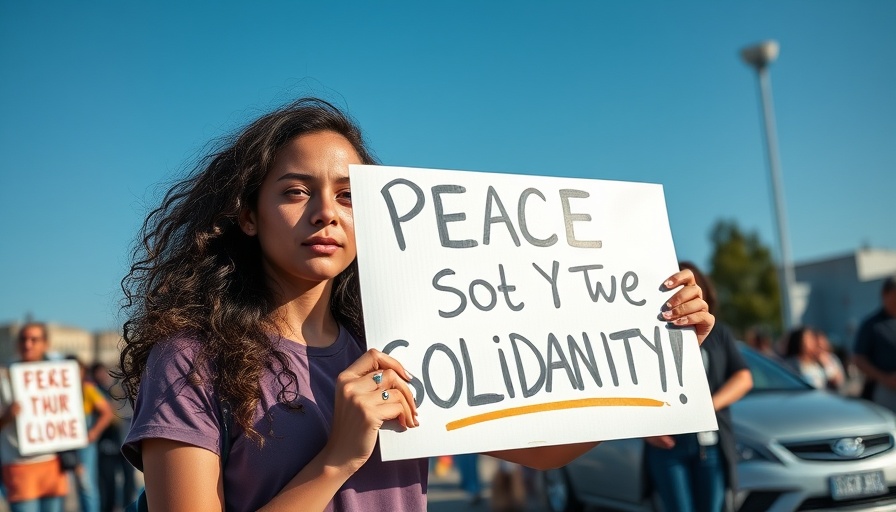
A Community United in Grief and Reflection
In the wake of an alarming arson attack on the Pennsylvania governor's residence, the state’s Jewish community finds itself grappling with an array of emotions. The vigil held outside the governor’s home, where around 200 people gathered from various faiths, illustrated a poignant moment of solidarity amongst diverse religious groups. In this gathering, Jewish, Christian, Sufi, and Baha’i members came together to pray, sing, and reflect on the implications of such violent acts.
On the night of April 13, shortly after celebrating the first night of Passover, Governor Josh Shapiro and his family were evacuated from their residence as flames engulfed rooms prepared for another Passover meal. The attack, characterized by Molotov cocktails thrown at the home, evoked a century-old anxiety that resurfaces each time an act of anti-Jewish violence occurs, reigniting fears of pogroms against Jewish communities globally and historically.
A Symbol of Troubling Times
The aftermath saw the arrest of Cody Balmer, who reportedly expressed violent intentions towards Governor Shapiro due to the rising tensions in the Israel-Palestine conflict. While Balmer’s motivations remain questionable, the symbolism of targeting a Jewish leader during a significant religious period is not lost on the community. Rabbi Melody Davis's sentiment, “For this to happen, [it] affects all of us,” echoes the collective pain and fear that permeated the vigil.
Layers of Antisemitism in a Divided Nation
The vigil's gathering offered an opportunity for shared grief but also opened a dialogue on rising antisemitism in America, especially in the context of the recent Gaza conflict. As perceptions of antisemitism evolve and amplify through political rhetoric, the Pennsylvania Jewish community is weighing how these attitudes influence their safety and identity. The ongoing military actions in Palestine have fueled opposing sentiments, complicating public discourse and prompting questions about the boundaries of free speech versus hate speech.
The Broader Context: Understanding the Rising Threats
Since the outbreak of violent tensions in Gaza beginning October 7, 2023, there has been a marked increase in hostility towards Jewish communities across the nation. Social media amplifies this reach, enabling the spread of both support and condemnation for actions taken by the Israeli government. The state of Pennsylvania has witnessed protests and discussions around what constitutes antisemitism and rightful criticism of Israel, often blurring lines for many individuals and organizations. Increasing rates of antisemitism are further complicated by historical grievances that still weigh heavily on Jewish families and traditional observances.
Solidarity Amidst Fear: Moving Beyond Division
The response from various faith leaders following the attack highlights the potential for interfaith solidarity in unprecedented times of crisis. Rabbi Capptauber’s initiative for a jiggle of prayers emphasizes a need for community cohesion beyond religious boundaries. “Let all who are hungry come and eat” not only speaks to the Jewish tradition of welcoming others during Passover but also reflects a broader understanding of humanity's shared vulnerabilities and experiences.
Actions and Future Prospects: A Call for Safety and Respect
As conversations continue around antisemitism, violence, and interfaith respect, the need for safety and security in vulnerable communities remains paramount. For the Jewish state of Pennsylvania and beyond, dialogues initiated in gatherings like this can serve as catalysts for real change. How communities navigate through the shadows of violence and hatred will shape their future interactions across diverse faith landscapes.
The emotional scars from the arson attack are yet to fully heal, but the resilience demonstrated at the vigil paints a hopeful narrative. It’s a call to action for supporting one another and ensuring that all communities feel safe and respected regardless of their background.
In conclusion, as tensions ripple through American society, learning from this incident allows each of us to make informed decisions on advocacy, support, and inclusivity. All Pennsylvanians have a role to play in fostering dialogue and action against hate.
 Add Row
Add Row  Add
Add 




 Add Row
Add Row  Add
Add 

Write A Comment